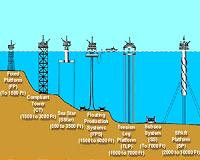 |
Washington (AFP) Dec 1, 2010 President Barack Obama on Wednesday reversed a March decision to expand offshore oil exploration to the Atlantic Ocean and eastern Gulf of Mexico, but allowed deepwater drilling to continue in the part of the Gulf hit by the BP disaster. The move, announced by Interior Secretary Ken Salazar, would ban until beyond 2017 oil and gas exploration in areas where there is currently no drilling activity, such as the eastern Gulf of Mexico off the coast of Florida, and the mid- and southern Atlantic Ocean. Drilling in the Arctic, where only one company, Shell, has applied for a permit to drill a well, would proceed with "the utmost caution," said Salazar. The reversal was made "in the wake of the Deepwater Horizon oil spill" which brought with it a stricter regulatory regime and tougher safety rules for offshore drilling, Salazar said. "We have revised our initial March announcement... to focus and expand our critical resources on areas with leases that are currently active," said Salazar. But the policy shift did not affect drilling in the central or western Gulf of Mexico, where an explosion on BP's Deepwater Horizon rig on April 20 triggered the worst maritime oil disaster in US history. "The modified plan allows currently scheduled lease sales to proceed in the western and central Gulf of Mexico, subject to rigorous environmental analysis," said Salazar. The decision brought mixed reactions from lawmakers in states that were affected by the Gulf oil spill or would have seen oil rigs off their coastlines if exploration had gone ahead in the Atlantic and eastern Gulf. Florida Democratic Senator Bill Nelson said the decision would safeguard his state's vital tourism and fishing industries, and Florida's "unique environment." Democrat Edward Markey of Massachusetts, who chairs key energy panels in the House of Representatives, said the policy shift showed "the Obama administration has heeded the lessons of the BP disaster. "This plan will move America forward on a prudent path until we can ensure that when an oil company drills ultra-deep, it is ultra-safe," he said. But Louisiana Democratic Senator Mary Landrieu, whose state was hardest hit by the BP disaster, called the decision a "major step backwards" for energy security. "The original five-year plan... signaled that this administration was serious about jobs and our nation's energy security. "Despite the rigorous new safety regulations that are now required as a result of the Deepwater Horizon accident, this administration has decided to make a U-turn," she said. The conservative US Chamber of Commerce slammed the Obama administration for keeping "America's abundant oil and natural gas resources under lock and key... ensuring that we will continue to increase our dependence on foreign oil." Republican Congressman John Culberson of Texas also gave the move the thumbs-down, saying it would "raise energy prices, dampen economic growth, send American jobs overseas, and inflict more pain and suffering on American consumers during these difficult economic times." And Kenneth Cohen of oil giant ExxonMobil said the decision would "eliminate badly needed government revenues, inhibit employment growth and increase reliance on imported energy." Environmental groups, which had bitterly opposed the March decision to open up new areas in the Atlantic and eastern Gulf to oil and gas exploration, gave the announcement a mixed reception. The Natural Resources Defense Council (NRDC) said the move "did not go far enough" because it left the door open for drilling in the Arctic and allowed seismic testing in the Atlantic, both of which could endanger fragile environments and the livelihoods of millions of Americans. Athan Manuel of the Sierra Club environmental group said that while keeping drilling out of the eastern Gulf and Atlantic was a "step in the right direction... an oil spill like the BP disaster could happen anywhere -- in Alaska or in the central and western Gulf where drilling is allowed." The explosion on the Deepwater Horizon rig in the Gulf of Mexico killed 11 workers and caused a record 4.9 million barrels, or 185 million gallons, of crude to spew into the sea, crippling the fishing and tourism industries in the Gulf coast states and causing untold damage to the region's fragile eco-system.
Share This Article With Planet Earth
Related Links Powering The World in the 21st Century at Energy-Daily.com
 Obama reverses oil drill expansion after BP spill
Obama reverses oil drill expansion after BP spillWashington (AFP) Dec 1, 2010 President Barack Obama on Wednesday reversed a March decision to expand offshore oil exploration to the Atlantic Ocean and eastern Gulf of Mexico, but said deepwater drilling could continue in the part of the Gulf hit by the BP disaster. The move, announced by Interior Secretary Ken Salazar, would ban until beyond 2017 oil and gas exploration in areas where there is currently no drilling act ... read more |
|
| The content herein, unless otherwise known to be public domain, are Copyright 1995-2010 - SpaceDaily. AFP and UPI Wire Stories are copyright Agence France-Presse and United Press International. ESA Portal Reports are copyright European Space Agency. All NASA sourced material is public domain. Additional copyrights may apply in whole or part to other bona fide parties. Advertising does not imply endorsement,agreement or approval of any opinions, statements or information provided by SpaceDaily on any Web page published or hosted by SpaceDaily. Privacy Statement |